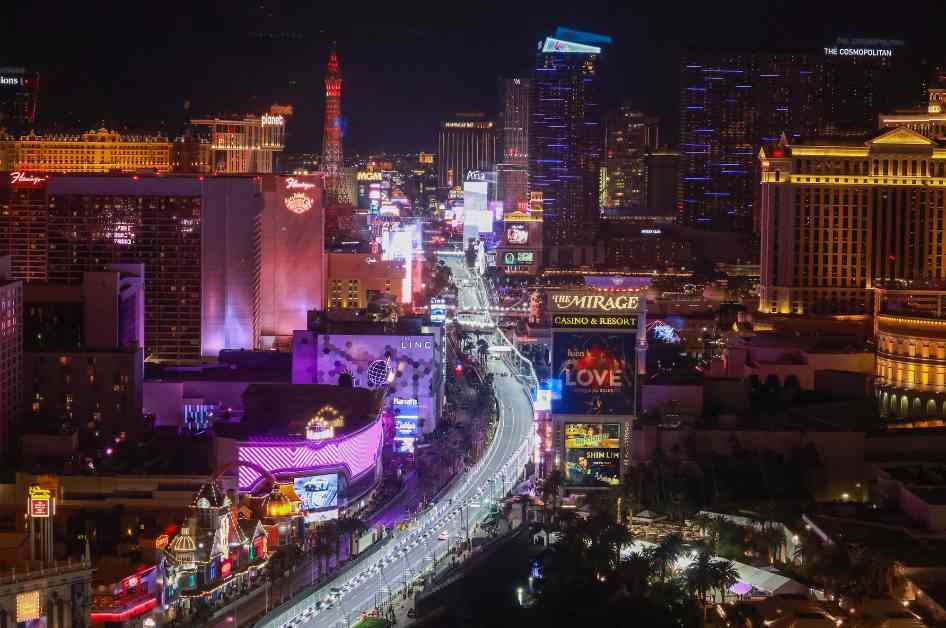Declining Strip Room Rates During Formula One Weekend: A Yellow Flag for Indy Gaming?
The anticipation for the upcoming Formula One Las Vegas Grand Prix is high, but the room rates at Strip hotels tell a different story. Gaming analyst Barry Jonas from Truist Securities has been closely monitoring the trends in room costs over the past seven weeks and has noted little upward movement. On race night (Nov. 23), the average room rate for MGM Resorts International Strip properties is currently $800, a significant drop from the $1,500 average rate seen during the Grand Prix last year. Even Caesars Entertainment properties are experiencing a decline in room rates, with rates dropping from $600 to $400 compared to last year. Despite the decrease in room rates, the resort industry remains optimistic about the boost in revenue that the Las Vegas Grand Prix will bring.
The Decline in Room Rates:
According to Jonas, the stability of room rates during the F1 weekend suggests that there has been little data to indicate any significant improvements or deterioration in recent weeks. While the current rates are lower than last year’s peak, they are still double the average room rate for November 2022 when there was no Grand Prix event. This decline in room rates has raised concerns among investors about the slowing growth in the market, especially in comparison to previous years.
Impact on MGM and Caesars Properties:
MGM Resorts International and Caesars Entertainment, two major players in the Las Vegas hospitality industry, have been directly affected by the declining room rates during the Grand Prix weekend. MGM’s CEO Bill Hornbuckle had previously mentioned “softness” in early hotel reservations for the race weekend, indicating a potential decrease in revenue. Caesars, with eight properties along the Strip portion of the track, has also seen a drop in room rates from last year. Despite the challenges, both companies remain optimistic about the overall success of the event and the opportunities it presents for attracting visitors.
Financial Outlook and Concerns:
Jonas’s research note highlighted MGM’s expectation of a $30 million loss due to the drop in hotel room rates during the race weekend. This projection reflects the potential impact of the declining rates on the company’s overall revenue during the Grand Prix. The concerns around slowing growth and tough comparisons with previous years have prompted investors to closely monitor the situation and assess the long-term implications for the gaming industry in Las Vegas.
Response from Industry Leaders:
While acknowledging the challenges posed by the declining room rates, Hornbuckle expressed confidence in a strong weekend during the F1 event. He emphasized the expected heavy traffic at Mandalay Bay and other south Strip resorts, particularly on the day when the Las Vegas Raiders host the Denver Broncos at Allegiant Stadium. Despite the current market conditions, industry leaders are working towards maximizing the opportunities presented by the Grand Prix and other events happening in the city.
Construction and Development:
As preparations for the F1 event continue, MGM has started construction on the Bellagio Fountain Club, a luxury trackside experience that will enhance the race weekend experience for guests. The removal of trees in front of the Bellagio fountains marks the beginning of this new project, which aims to create a unique and upscale environment for attendees. The temporary closure of two southbound lanes of the Strip in front of the Bellagio is part of the ongoing construction work that will enhance the overall ambiance and offerings for visitors during the Grand Prix.
Legislation for Nationwide Sports Betting Ban:
In a separate development, federal lawmakers have introduced legislation proposing a nationwide ban on sports betting, which has raised concerns among industry stakeholders. The bill, sponsored by Sen. Richard Blumenthal and Rep. Paul Tonko, seeks to federalize sports betting laws and impose restrictions on advertising, wagering types, and the use of artificial intelligence in the industry. The proposed legislation has been met with criticism from Rep. Dina Titus, who believes that state regulators should have the authority to oversee sports betting activities and promote consumer protection.
Potential Impact on Gaming Industry:
The push for a nationwide ban on sports betting comes at a time when the industry is experiencing significant growth and generating substantial revenue. The American Gaming Association reports that Americans wagered nearly $120 billion legally on sports in 2023, highlighting the popularity and economic impact of sports betting. The proposed legislation could have far-reaching implications for the gaming industry, affecting advertising practices, wagering options, and regulatory frameworks across different states.
Boyd Gaming Expansion in Virginia:
On a positive note, Boyd Gaming is set to expand its presence to Virginia through a partnership with the Pamunkey Indian Tribe for a new casino project in Norfolk. The city council’s approval of the resolution paves the way for Boyd to develop a temporary casino followed by a permanent resort with various amenities. This strategic move reflects Boyd’s commitment to diversifying its portfolio and tapping into new markets to drive growth and innovation in the gaming industry.
In conclusion, the declining room rates during the Formula One Las Vegas Grand Prix weekend raise questions about the overall health of the gaming industry in the city. While challenges exist, industry leaders remain optimistic about the potential for growth and success in the long run. The proposed legislation for a nationwide sports betting ban adds another layer of complexity to the regulatory landscape, underscoring the need for a balanced approach to addressing industry issues. As developments unfold and preparations for the Grand Prix continue, stakeholders in the gaming industry will closely monitor the situation and adapt to the evolving market dynamics.

